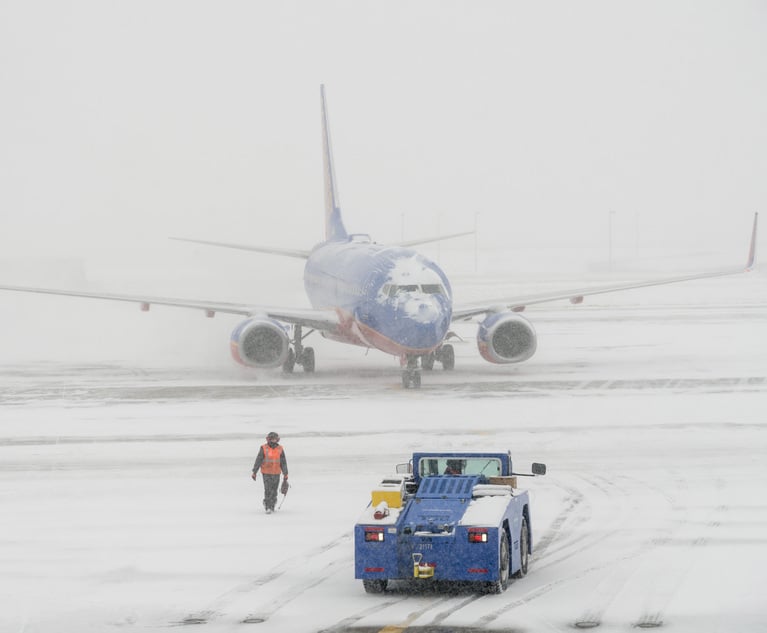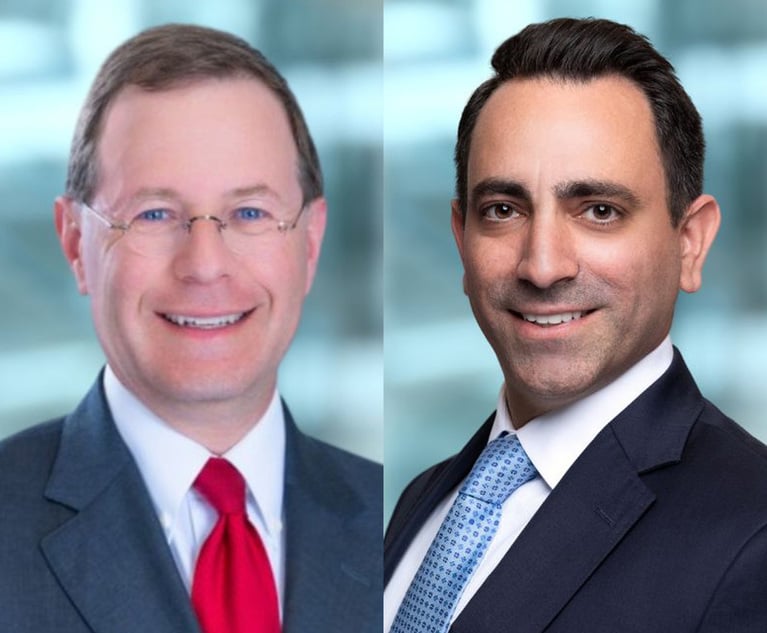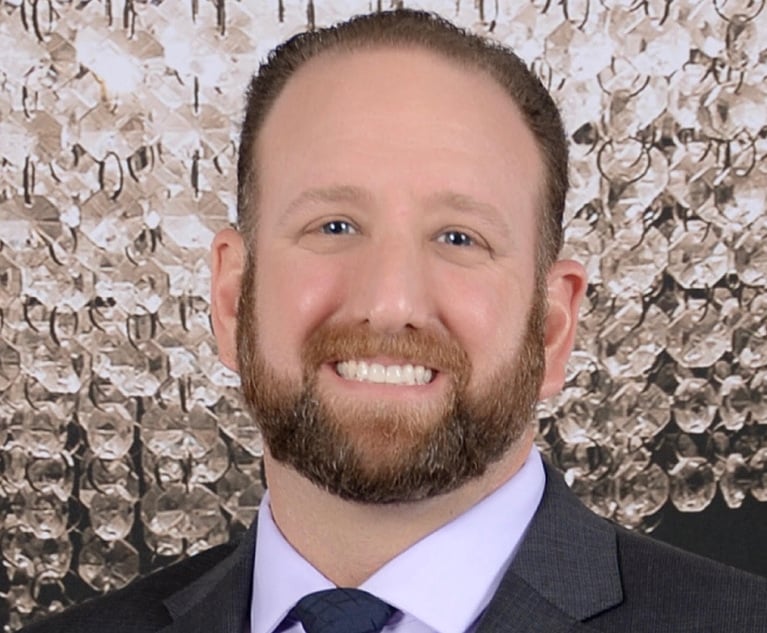 Edward Dabdoub of the Dabdoub Law Firm in Coral Gables. Photo: Allison Langer.
Edward Dabdoub of the Dabdoub Law Firm in Coral Gables. Photo: Allison Langer.Ex-NFL Lineman Darryl Ashmore Wins Scrimmage Over Disability Benefits
Miami disability lawyers Edward Dabdoub, Carter Meader Sox and Kevin Schaefer won a nearly $217,800 judgment against the National Football League for Darryl Ashmore, who says his sports-related injuries left him disabled and out of work.
July 30, 2018 at 10:59 AM
5 minute read
Edward Dabdoub, Carter Meader Sox and Kevin Schaefer of the Dabdoub Law Firm in Coral Gables won a nearly $218,000 judgment for Darryl Ashmore, a former football player whose attorneys said he felt “ambushed” when the National Football League denied him coverage under its Player Disability & Neurocognitive Benefit Plan.
The plan is an employee welfare program designed to ”promote the long-term well-being” of former players. It provides monthly payments of $11,000-$22,000 to participants who suffer “total and permanent disability.”
After more than 11 seasons as a professional athlete, Ashmore claimed he suffers from a host of football-related ailments that qualify him for coverage. His lawsuit filed in October 2016 in West Palm Beach listed migraines, herniated discs, hypertension, degenerative arthritis, and chronic pain in his neck, knees, back, wrist and shoulders.
Ex-Offensive Lineman Files Disability Claim Against NFL
But The NFL plan denied his application for disability benefits after Ashmore failed to attend prerequisite medical examinations. The former professional athlete tried working with the NFL to reschedule the exams closer to his Boynton Beach home, because the original travel itinerary would have crippled a man in Ashmore's condition, according to his attorneys.
 Oakland Raiders Darryl Ashmore poses for 1999 team headshot. AP Photo/NFL Photos
Oakland Raiders Darryl Ashmore poses for 1999 team headshot. AP Photo/NFL Photos
Ashmore played for the Los Angeles/St. Louis Rams, the Washington Redskins and the Oakland Raiders between 1992 and 2002. His case litigated its way to judgment, and on July 15 United States District Judge Kenneth A. Marra issued an order awarding Ashmore nearly $217,798, which includes past-due benefits and a pre-judgment interest of about $16,428.
When Ashmore's attorney, Dabdoub, first submitted the disability application in 2015, he considered it to be “relatively straightforward.” The NFL then reached out to schedule independent medical examinations, as was the norm.
But issues arose when Ashmore was scheduled for medical exams in three different cities across Texas and Florida, all within a week.
“We wrote them back saying, 'It's fine and dandy you want him to partake in these examinations,'” recalled Dabdoub . “He's willing to cooperate, but please appreciate that he's physically unable to endure the type of travel that you want him to do without exacerbation of his medical condition,'” Dabdoub recalls.
But the NFL “refused to budge,” and after some back-and-forth discussions over whether it would be amenable to granting accommodations to Ashmore, his application was abruptly denied.
“While we were awaiting a response to that specific request, we were blindsided with a denial letter that basically said, 'You didn't show up to your examinations and that's an automatic denial.' It was as simple as that,” Dabdoub said.
Ashmore appealed to the NFL Disability Plan Board, who “rubber-stamped” the denial.
At that point, a lawsuit was the “only logical next step,” according to Dabdoub.
Throughout the year and a half of litigation that followed, Dabdoub was disappointed with the way the defense fought their case.
“They had maintained their position entirely, that he just didn't show up and it's that simple. It isn't. It wasn't. It can never be. Because these players are in horrific shape. It was not necessary to have fought until the bitter end.”
The NFL and their defense team, Brian Douglas Equi of Goldberg Segalla in Orlando and Michael L. Junk of Groom Law Group in Washington, D.C., did not respond to requests for comment before press time.
At one point, the defense threatened to file a motion for sanctions against Dabdoub, arguing that he'd brought a frivolous case.
“Of course, nothing can be further from the truth, as evidenced by the fact that we won the lawsuit,” Dabdoub said.
The win could have implications for future cases brought by NFL players — an issue that is particularly prevalent, according to Dabdoub.
“We're increasingly getting calls from former players who are being denied for lots of reasons. Who knows what's going on behind closed doors? It's not for me to say, but it seems that they should be paying a lot of these players when they're not,” Dabdoub said.
Meanwhile, Ashmore is part of another case against the NFL, which will settle thousands of concussion lawsuits against the league by former players diagnosed with brain injuries. The settlement covers about 20,000 NFL retirees over a 65-year period, with payouts for players or their beneficiaries.
Related stories:
This content has been archived. It is available through our partners, LexisNexis® and Bloomberg Law.
To view this content, please continue to their sites.
Not a Lexis Subscriber?
Subscribe Now
Not a Bloomberg Law Subscriber?
Subscribe Now
NOT FOR REPRINT
© 2024 ALM Global, LLC, All Rights Reserved. Request academic re-use from www.copyright.com. All other uses, submit a request to [email protected]. For more information visit Asset & Logo Licensing.
You Might Like
View All
Southwest Airlines Faces $100M Class Action Over Pay Periods



'Get Rid of the Men': Employer Accused of Discrimination
Trending Stories
- 1Judicial Ethics Opinion 24-89
- 2It's Time To Limit Non-Competes
- 3Jimmy Carter’s 1974 Law Day Speech: A Call for Lawyers to Do the Public Good
- 4Second Circuit Upholds $5M Judgment Against Trump in E. Jean Carroll Case
- 5Clifford Chance Hikes Partner Pay as UK Firms Fight to Stay Competitive on Compensation
Who Got The Work
Michael G. Bongiorno, Andrew Scott Dulberg and Elizabeth E. Driscoll from Wilmer Cutler Pickering Hale and Dorr have stepped in to represent Symbotic Inc., an A.I.-enabled technology platform that focuses on increasing supply chain efficiency, and other defendants in a pending shareholder derivative lawsuit. The case, filed Oct. 2 in Massachusetts District Court by the Brown Law Firm on behalf of Stephen Austen, accuses certain officers and directors of misleading investors in regard to Symbotic's potential for margin growth by failing to disclose that the company was not equipped to timely deploy its systems or manage expenses through project delays. The case, assigned to U.S. District Judge Nathaniel M. Gorton, is 1:24-cv-12522, Austen v. Cohen et al.
Who Got The Work
Edmund Polubinski and Marie Killmond of Davis Polk & Wardwell have entered appearances for data platform software development company MongoDB and other defendants in a pending shareholder derivative lawsuit. The action, filed Oct. 7 in New York Southern District Court by the Brown Law Firm, accuses the company's directors and/or officers of falsely expressing confidence in the company’s restructuring of its sales incentive plan and downplaying the severity of decreases in its upfront commitments. The case is 1:24-cv-07594, Roy v. Ittycheria et al.
Who Got The Work
Amy O. Bruchs and Kurt F. Ellison of Michael Best & Friedrich have entered appearances for Epic Systems Corp. in a pending employment discrimination lawsuit. The suit was filed Sept. 7 in Wisconsin Western District Court by Levine Eisberner LLC and Siri & Glimstad on behalf of a project manager who claims that he was wrongfully terminated after applying for a religious exemption to the defendant's COVID-19 vaccine mandate. The case, assigned to U.S. Magistrate Judge Anita Marie Boor, is 3:24-cv-00630, Secker, Nathan v. Epic Systems Corporation.
Who Got The Work
David X. Sullivan, Thomas J. Finn and Gregory A. Hall from McCarter & English have entered appearances for Sunrun Installation Services in a pending civil rights lawsuit. The complaint was filed Sept. 4 in Connecticut District Court by attorney Robert M. Berke on behalf of former employee George Edward Steins, who was arrested and charged with employing an unregistered home improvement salesperson. The complaint alleges that had Sunrun informed the Connecticut Department of Consumer Protection that the plaintiff's employment had ended in 2017 and that he no longer held Sunrun's home improvement contractor license, he would not have been hit with charges, which were dismissed in May 2024. The case, assigned to U.S. District Judge Jeffrey A. Meyer, is 3:24-cv-01423, Steins v. Sunrun, Inc. et al.
Who Got The Work
Greenberg Traurig shareholder Joshua L. Raskin has entered an appearance for boohoo.com UK Ltd. in a pending patent infringement lawsuit. The suit, filed Sept. 3 in Texas Eastern District Court by Rozier Hardt McDonough on behalf of Alto Dynamics, asserts five patents related to an online shopping platform. The case, assigned to U.S. District Judge Rodney Gilstrap, is 2:24-cv-00719, Alto Dynamics, LLC v. boohoo.com UK Limited.
Featured Firms
Law Offices of Gary Martin Hays & Associates, P.C.
(470) 294-1674
Law Offices of Mark E. Salomone
(857) 444-6468
Smith & Hassler
(713) 739-1250






